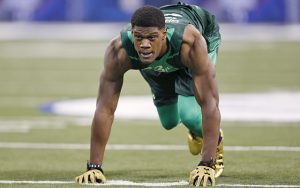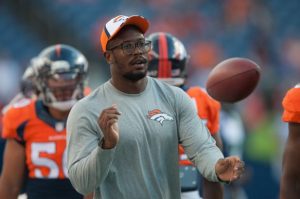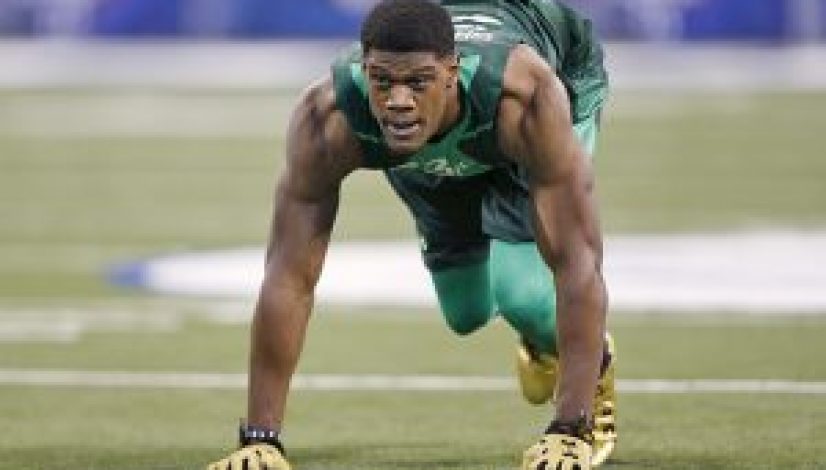The NFL’s Policy for Weed and Other Drugs
We see it every year in the NFL, a relatively high profile player on an NFL team suspended by the league for testing positive for marijuana. When a player suspension for marijuana is reported in the media, very little is disclosed as to what happened in the lead up to that player’s suspension. The goal of this article is to provide transparency to the NFL Drug Intervention Program and how the NFL tests for cannabis.
What you will find below will tell you what the NFL tests for, when the players are tested, what the different stages of the drug intervention program include, and the different punishments for failed tests.
What Gets Tested
Before entering any intervention stage players are tested for the following substances:
- Cocaine
- Marijuana
- Synthetic Cannabinoids
- Amphetamine
- Opiates (morphine and codeine)
- Opiods (hydrocodone, oxycodone)
- Phencyclidine (PCP)
- Methlendedjoxymethamphetamine (MDMA)
- Alcohol – Alcohol is prohibited only if a player’s treatment plan explicitly prohibits alcohol, but all players in intervention stages are tested for Alcohol for clinical monitoring purposes. Discipline for alcohol use is imposed only if a player’s treatment plan prohibits alcohol.
 Randy Gregory suspended after failing drug test during 2015 combine
Randy Gregory suspended after failing drug test during 2015 combine
When Do Players Get tested
Players entering the league through the NFL draft are tested at the NFL combine held every year in Indianapolis. If a player does not attend the combine, a player can be tested at their pro-day typically held at the university or college where the player played.
All Players under contract with an NFL Club will be tested once during the period beginning April 20th (interesting irony with the 4/20 date there) and continuing through August 9. A player who is signed after the date of the pre-season test may be given his pre-season test individually after the rest of the team.
Stage I
 Denver Bronco, Von Miller Released from NFL Drug Program
Denver Bronco, Von Miller Released from NFL Drug Program
Players enter stage I of the intervention program by one of three methods – Positive Test Result, Behavior or Self-Referral. The first positive test result leading to stage I entry is not made public or reported directly to the NFL club the player is under contract with.
A player who enters the intervention program will remain until he is discharged in accordance with the terms established in the policy. Players will remain in stage one for a period not to exceed 90 days; provided however, that the medical director may extend the time a player is in stage one by an additional 90 days. The caveat to the caveat is that the medical director can determine a period in excess of 180 total days due to unusual and compelling circumstances. To be clear of the stage I program typically takes 90 days, can be extended to 180 days, and in unusual cases can be further extended beyond 180 days without going into stage II. Failure to comply with stage I is determined by the medical examiner, who will evaluate if a failed, missed, or diluted test will result in a failure to comply, which will then result in punishment for the player. If a player fails to comply with the stage I process, the player is fined 3/17 of his salary and advanced to stage II of the drug program. Player suspension is not a disciplinary action taken at this stage. A player that self refers himself cannot be fined for failure to comply with the program unless his status is converted into a mandatory entrant into the program. Stage I makes no explicit references relating to marijuana, or specific punishment for the use of cannabis. Stage II All players in stage II will be subject to unannounced testing subject to the terms of the NFL drug testing policy. Testing frequency is the sole discretion of the Medical Adviser, and also whether or not a player is or is not tested. A player may not be tested more than ten times during any calendar month. A player in Stage II that fails to comply with the Stage II intervention program is subject to: First Violation:
- A fine of four-seventeenths (4/17) of the player’s salary, OR
- A suspension without pay of four regular and/or postseason games (including the Pro Bowl, if selected) if he did not successfully complete stage one.
Second Violation:
- A suspension without pay of four regular and/or postseason games (including the Pro Bowl, if selected) if he was previously fined for Stage II noncompliance; or
- A suspension without pay of six regular and/or postseason games (including the Pro Bowl, if selected) if he was previously suspended for Stage II noncompliance; and
- Advanced to Stage III.
Discipline if First Stage Two Violation is for Marijuana:
If a player’s first positive test result in stage two is for marijuana, the player shall be subject to a fine of two-seventeenths (2/17) of the player’s salary. The discipline schedule set forth in the paragraph above for a first violation of stage II (increased fines and suspensions up to 6 games).
Discipline if First Stage Three Violation is for Marijuana:
If a player’s first positive test result after being advanced to stage III is for marijuana, the player shall be suspended without pay for ten (10) regular season and/or postseason games (including the Pro Bowl, if selected). For any subsequent violations the player shall be banished for the duration of year.
Some of the more well know NFL players suspended for marijuana consumption:
Ricky Williams – Suspended for the entirety of the 2006 season, his career from 1999 through 2011 was spotted with many suspensions for cannabis consumption. His career was met with a great deal of anticipation and despite many partial seasons and early retirement, he still had a number of 1,000 plus yard seasons.
Von Miller – An active player for the Denver Broncos as an outside linebacker, he won the Super Bowl 50 MVP and has been selected for the Pro Bowl six times. He was suspended for four games in 2013, one year after Colorado legalized recreational marijuana.
Le’Veon Bell – An active player for the Pittsburgh Steelers as a running back, he has been selected to three Pro Bowls and is one of the best running backs playing in the game today. He was suspended for three games in 2016 for marijuana consumption.
Facebook Comments
Tags
cannabis newsfinesmarijuana in sportsmarijuana legalizationNFLNFL’s Substance Abuse ProgramSage IStage IIsuspensions


